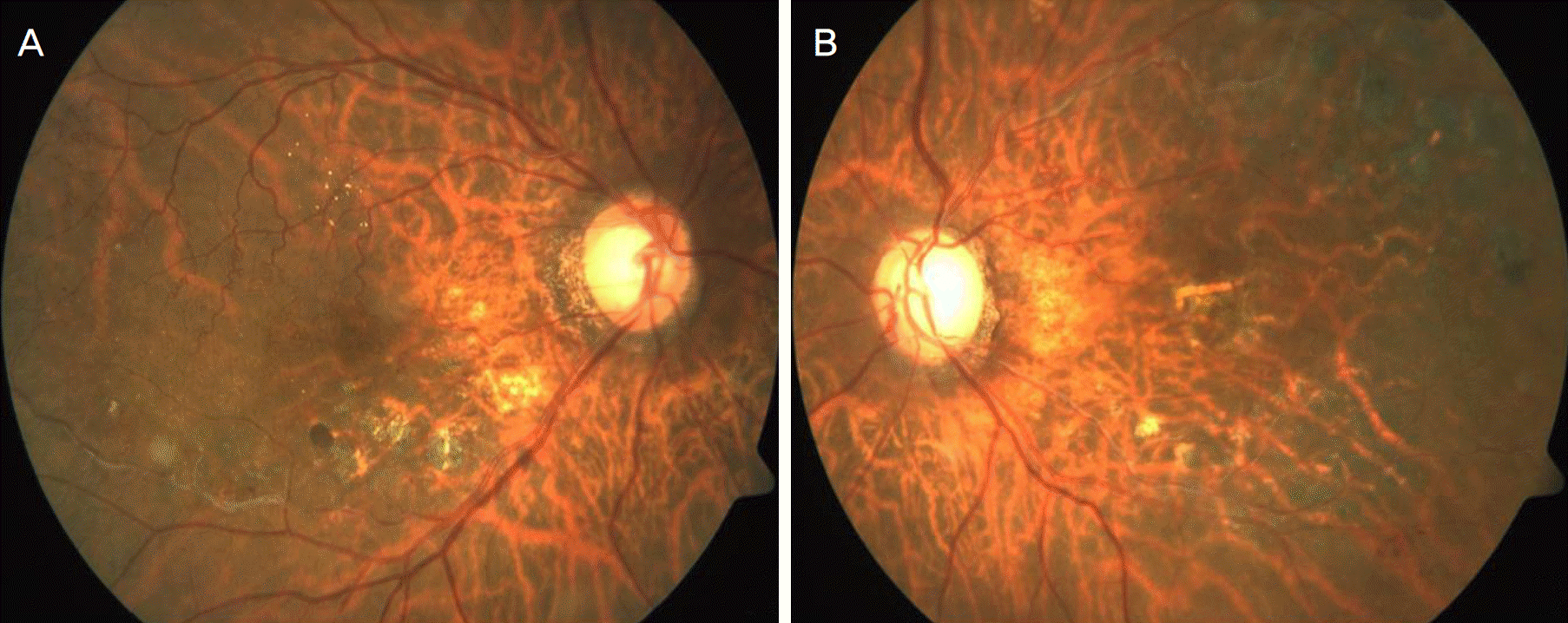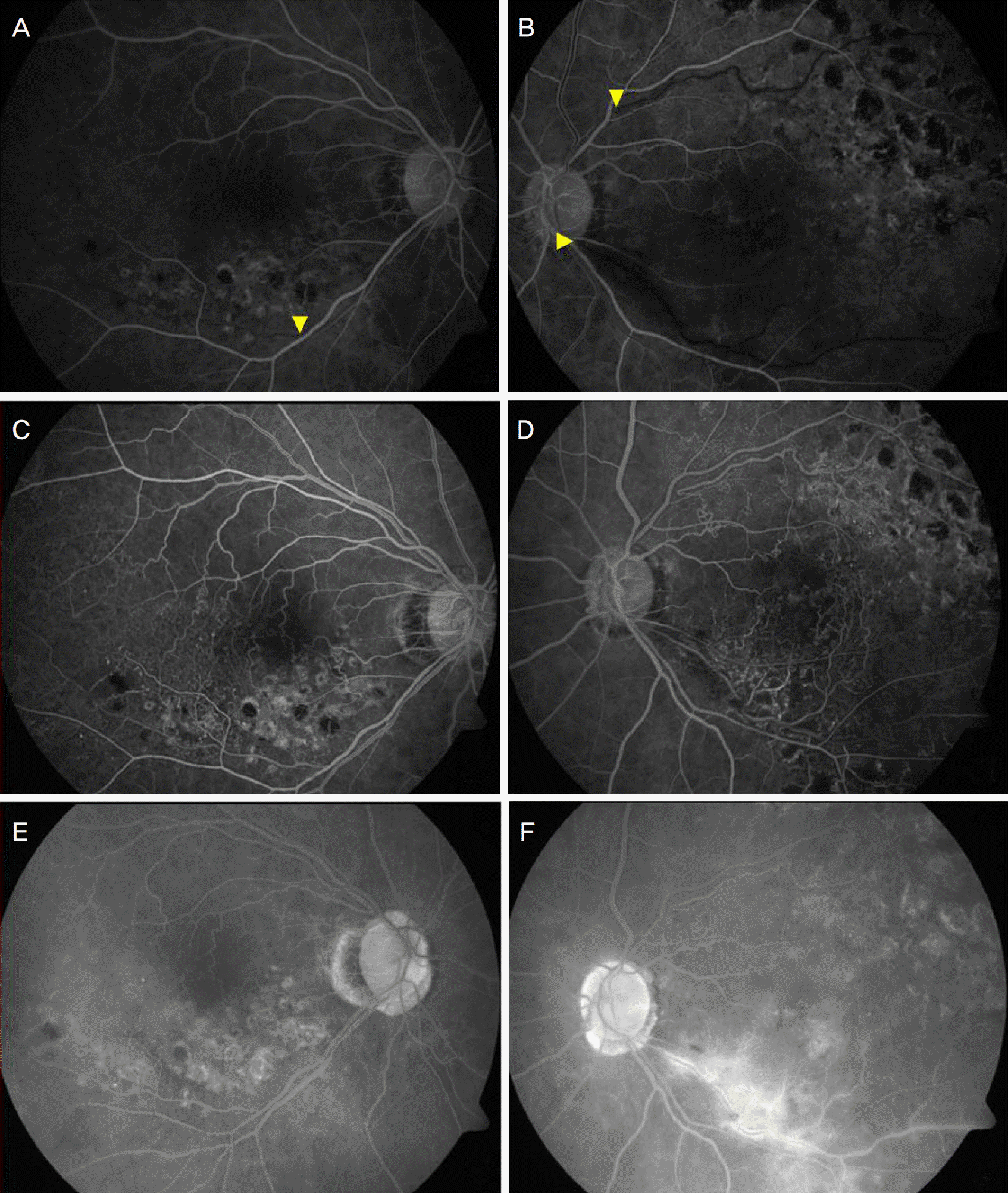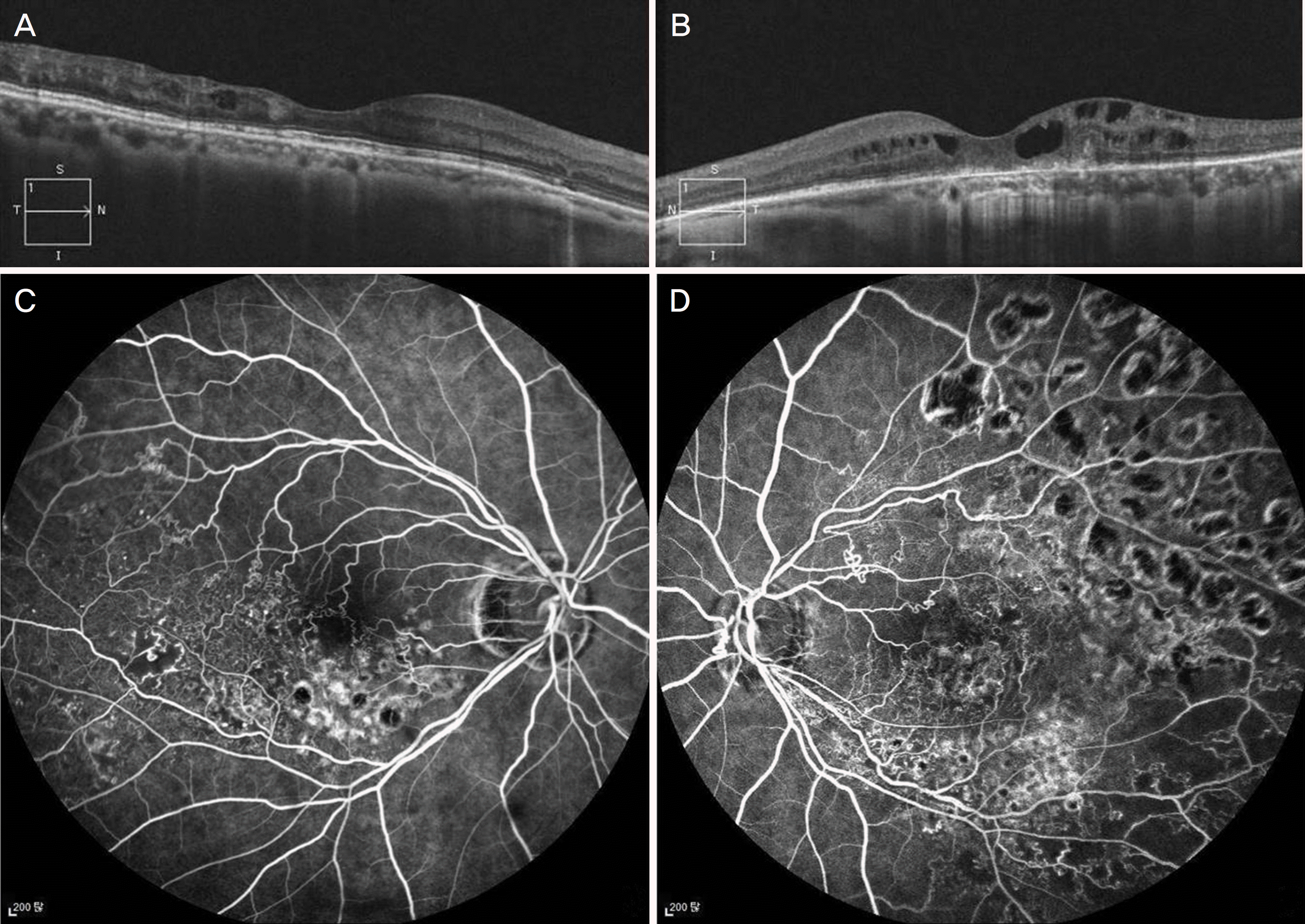Abstract
Purpose
To report a case of bilateral branch retinal vein occlusion development after taking long-term tamoxifen adjuvant therapy.
Case summary
A 72-year-old female breast cancer patient with a 10-year history of tamoxifen intake presented with decreased visual acuity that began 5 years prior. The patient had no other past history. The best corrected visual acuity (BCVA) was 0.3 in the right eye and 0.04 in the left eye. There was no specific finding of anterior segment on slit lamp examination. On fundus examination, sheathed branch retinal veins were observed in the inferotemporal area of the right eye and superotemporal and inferotemporal areas of the left eye. Microangiopathies were observed around the occluded branch retinal veins in both eyes and macular edema was present in the left eye. Laser photocoagulation was performed at the non-perfusion area in both eyes and an intravitreal injection of bevacizumab and 3 intravitreal injections of triamcinolone were administered into the left eye. The BCVA did not change after 3 years and remained relatively stable.
Go to : 
References
1. Lewis DR, Chen HS, Cockburn M, et al. Preliminary estimates of SEER cancer incidence for 2013. Cancer. 2016; 122:1579–87.

2. Anderson WF, Chatterjee N, Ershler WB, Brawley OW. Estrogen receptor breast cancer phenotypes in the Surveillance, Epidemiology, and End Results database. Breast Cancer Rest Treat. 2002; 76:27–36.

3. Early Breast Cancer Trialists' Collaborative Group (EBCTCG). Effects of chemotherapy and hormonal therapy for early breast cancer on recurrence and 15-year survival: an overview of the randomised trials. Lancet. 2005; 365:1687–717.
4. Tamoxifen for early breast cancer: an overview of the randomised trials. Early Breast Cancer Trialists' Collaborative Group. Lancet. 1998; 351:1451–67.
5. Fisher B, Costantino JP, Wickerham DL, et al. Tamoxifen for abdominalion of breast cancer: report of the National Surgical Adjuvant Breast and Bowel Project P-1 Study. J Natl Cancer Inst. 1998; 90:1371–88.
6. Cuzick J, Forbes J, Edwards R, et al. First results from the International Breast Cancer Intervention Study (IBIS-I): a abdominal prevention trial. Lancet. 2002; 360:817–24.
7. Cuzick J, Forbes JF, Sestak I, et al. abdominal results of tamoxifen prophylaxis for breast cancer-96-month follow-up of the abdominal IBIS-I trial. J Natl Cancer Inst. 2007; 99:272–82.
8. Caine GJ, Stonelake PS, Rea D, Lip GY. Coagulopathic complications in breast cancer. Cancer. 2003; 98:1578–86.

9. Mannucci PM, Bettega D, Chantarangkul V, et al. Effect of abdominal on measurements of hemostasis in healthy women. Arch Intern Med. 1996; 156:1806–10.
10. Pemberton KD, Melissari E, Kakkar VV. The influence of abdominal in vivo on the main natural anticoagulants and fibrinolysis. Blood Coagul Fibrinolysis. 1993; 4:935–42.
11. Jordan VC, Fritz NF, Tormey DC. abdominal adjuvant therapy with tamoxifen: effects on sex hormone binding globulin and an-tithrombin III. Cancer Res. 1987; 47:4517–9.
12. Mamby CC, Love RR, Feyzi JM. Protein S and protein C level changes with adjuvant tamoxifen therapy in postmenopausal women. Breast Cancer Res Treat. 1994; 30:311–4.

13. Weitz IC, Israel VK, Liebman HA. Tamoxifen-associated venous thrombosis and activated protein C resistance due to factor V Leiden. Cancer. 1997; 79:2024–7.

14. Gorin MB, Costantino JP, Kulacoglu DN, et al. Is tamoxifen a risk factor for retinal vaso-occlusive disease? Retina. 2005; 25:523–6.

15. Heier JS, Dragoo RA, Enzenauer RW, Waterhouse WJ. Screening for ocular toxicity in asymptomatic patients treated with tamoxifen. Am J Ophthalmol. 1994; 117:772–5.

16. Browning DJ. Retinal Vein Occlusions: Evidence-based Management. New York: Springer;2012. p. 160.
17. Kirwan JF, Tsaloumas MD, Vinall H, et al. Sex hormone preparations and retinal vein occlusion. Eye (Lond). 1997; 11(Pt 1):53–6.

18. Schlich B, Heidrich H, Keuch R, Bleckmann H. Occlusion of abdominal arteries and thrombotic angiopathy of the retina during abdominal tamoxifen therapy of a mammary carcinoma. Dtsch Med Wochenschr. 1997; 122:783–6.
19. Onder H, Kilic AC, Kose SA, et al. Branch retinal vein occlusion associated with tamoxifen use. Semin Ophthalmol. 2013; 28:88–90.

20. Fraenkl SA, Mozaffarieh M, Flammer J. Retinal vein occlusions: The potential impact of a dysregulation of the retinal veins. EPMA J. 2010; 1:253–61.

21. Howell A, Cuzick J, Baum M, et al. Results of the ATAC (Arimidex, Tamoxifen, Alone or in Combination) trial after completion of 5 years' adjuvant treatment for breast cancer. Lancet. 2005; 365:60–2.
Go to : 
 | Figure 1.Color fundus photopgraphs of the both eyes. (A) Color fundus photography of the right eye showing sheathed retinal vessel in inferotemporal area with old laser scars. Hyperreflective crystalline dot-like deposits at superior perifoveal area were seen. (B) Color fundus photography of the left eye demonstrating sheathed retinal vessels with old laser scars in superotemporal and inferotemporal area. |
 | Figure 2.Fluorescein angiogram of the both eyes. (A) Early venous phase fluorescein angiogram of the right eye showing lack of perfusion (arrowhead) in inferotemporal second branch retinal vein. (B) Early venous phase fluorescein angiogram of the left eye showing occlusions (arrowheads) in superotemporal second brach and inferotemporal first brach retinal vein. Late venous phase fluorescein angiogram of the right eye (C), and left eye showing non-perfusion area in inferotemporal regions in the left eye (D). Late phase fluorescein angiogram of the right eye (E) and left eye (F) demonstrating fluorescein leakage. |
 | Figure 3.Optical coherence tomographs of the both eyes. Optical coherence tomography showing retinal cysts on temporal parafoveal area with retinal atrophy in the right eye (A) and cystoids macular edema in the left eye (B). |
 | Figure 4.Optical coherece tomographs and venous phase fluorescein angiogram of the both eyes 3 years after the first visit. Optical coherence tomography demonstrating retinal atrophy on temporal macula of the right eye (A), and cystoid macular edema in the left eye (B). Venous phase fluorescein angiogram of the right eye (C) and left eye (D) showing non-perfusion area in both eyes. |




 PDF
PDF ePub
ePub Citation
Citation Print
Print


 XML Download
XML Download